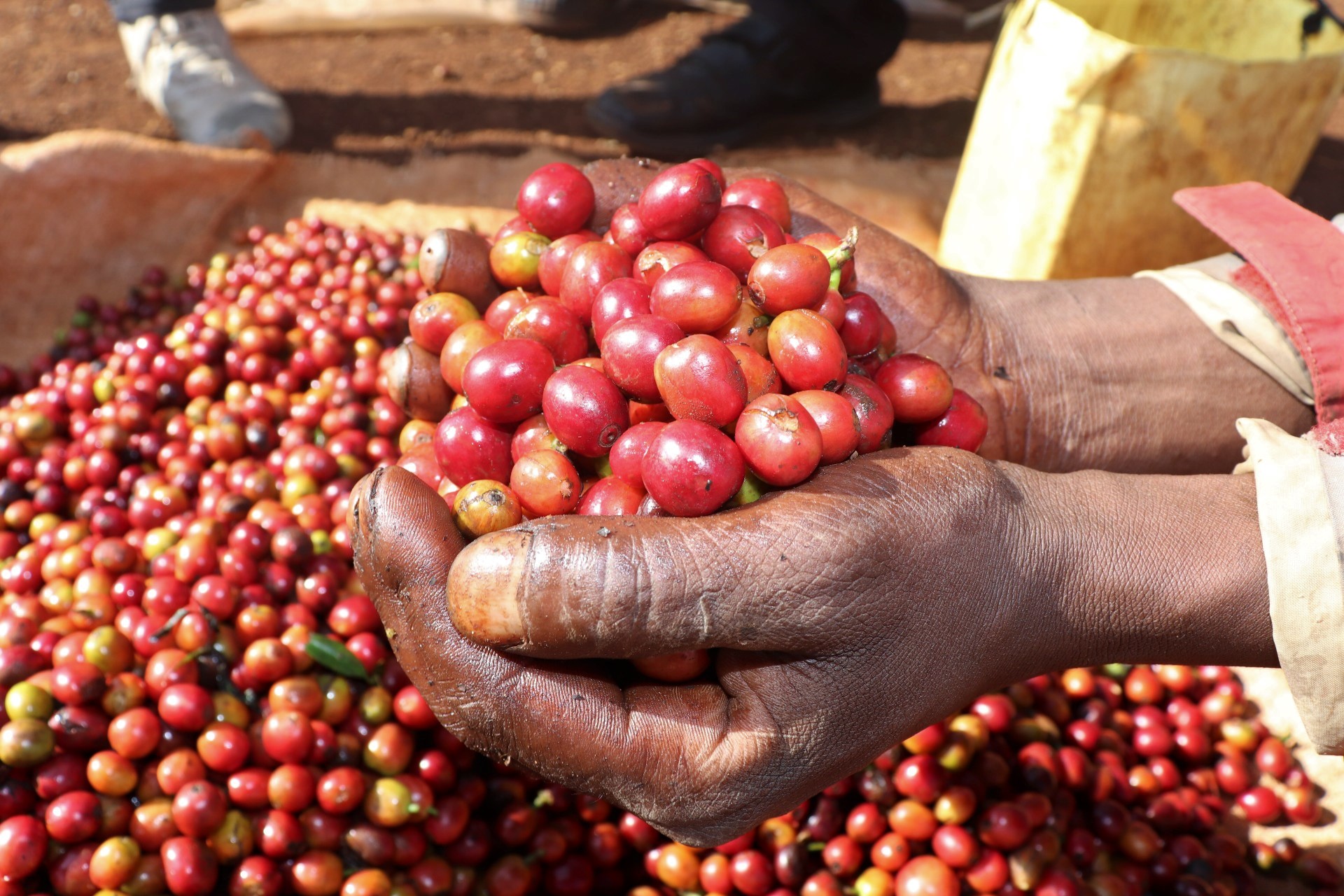Kenya Nyeri Gikanda Gichathaini AB – 47CK0034 *51638* – 25567 – GrainPro Bags – SPOT RCWHSE
Position Spot
Bags 0
Warehouses Oakland
Flavor Profile Tangerine, honeydew, floral, milk chocolate
Please Note This coffee landed more than 8 months ago.
Out of stock
About this coffee
Grower
897 producers organized around the Gichathaini coffee Factory
Altitude
1600 - 1900 masl
Variety
Batian, SL28, SL34, and Ruiru 11
Soil
Volcanic loam
Region
Nyeri County, Kenya
Process
Fully washed and dried in raised beds
Harvest
May - June
Certification
Conventional
Coffee Background
Mt. Kenya, at the helm of Kenya’s Central Province, is the second tallest peak on the continent of Africa and a commanding natural presence. The mountain itself is a single point inside a vast and surreal thicket of ascending national forest and active game protection communities. The central counties of Kenya extend from the center of the national park, like five irregular pie slices, with their points meeting at the peak of the mountain. It is along the lower edge of these forests where, in wet, high elevation communities with mineral-rich soil (Mt. Kenya is a stratovolcano) many believe the best coffees in Kenya, often the world, are crafted.
Nyeri is perhaps the most well-known of these central counties, and sits between Mt. Kenya to the north, and the Aberdare mountain range to the West, whose combined climates provide cool air, ample groundwater, and reliable precipitation throughout the year, allowing coffee to be comfortably grown at high altitudes and supporting fully-washed processing throughout the region.
Kenya’s coffee is dominated by a cooperative system of production, whose members vote on representation, marketing and milling contracts for their coffee, as well as profit allocation. Gikanda Farmers Cooperative Society, the umbrella organization that includes Gichathaini factory, is one of Kenya’s best-known Nyeri groups for annual quality. The
society includes only 3 factories, all of which are located close to the town of Karatina. Gichathaini’s farmer members, as is common throughout Kenya, tend very small, diversified personal plots averaging 1 acre apiece, and typically including only about 200 trees. Water for processing at Gichathaini is drawn from the nearby Ragati river and is re-circulated throughout the various processing steps as cleanliness allows for conservation.
“47CK0034” in the title refers to this coffee’s “outturn” number. Outturn numbers are unique microlot codes that are given to each and every batch of parchment delivered to dry mills from individual factories or estates anywhere in Kenya, and are the units on which Kenya’s entire microlot export system is built. Outturns in Kenya are tracked with a shorthand code that places the specific batch of parchment coffee in time, place, and sequentially with other coffees. Outturns are stylized as an 8 or 9-character code, including a 2-digit “coffee week” number, a 2-letter mill code, and a 3 or 4-digit intake number for the coffee’s delivery. So, this particular lot was delivered in harvest week 47, to the Central Kenya Coffee Mill (code “CK”), and was the 34th delivery that week. This particular lot comes from Gichathaini’s “fly crop”, a smaller secondary harvest common in many equatorial coffee producing countries that follows a secondary rainy season. Fly crop Kenyas are not as large or sought-after as the main harvest, but nonetheless can yield exquisite tasting coffee.
Kenya is of course known for some of the most meticulous at-scale processing that can be found anywhere in the world. Bright white parchment, nearly perfectly sorted by density and bulk conditioned at high elevations is the norm, and a matter of pride, even for generations of Kenyan processing managers who prefer drinking Kenya’s tea (abundantly farmed in Muranga county, to Nyeri’s south) to its coffee. Ample water supply in the central growing regions has historically allowed factories to wash, and wash, and soak, and wash their coffees again entirely with fresh, cold river water. Conservation is creeping into the discussion in certain places--understandably in the drier areas where water, due to climate change, cannot be as taken for granted—but for the most part Kenya continues to thoroughly wash and soak its coffees according to tradition. The established milling and sorting by grade, or bean size, is a longstanding tradition and positions Kenya coffees well for roasters, by tightly controlling the physical preparation and creating a diversity of profiles from a single processing batch.








